Christian Foundations Series (7 vols.)
Digital Logos Edition
Overview
The Christian Foundations Collection brings together all seven volumes of Donald G. Bloesch’s Christian Foundations series. This comprehensive, systematic theology for the twenty-first century contributes significantly to late modern evangelical theology while exploring what an ancient faith has to say to perplexing new times. The Christian Foundations Collection will be of great help to all who want to hold to orthodoxy and honestly engage contemporary thought.
Throughout the Christian Foundations series Bloesch offers a fresh, biblical response to the trends permeating modern Christianity, including relativism, feminine-gender language for God, evangelical rationalism, and many more. Bloesch also presents new approaches to the long-standing issues of biblical authority, Christology, ecclesiology, and eschatology, among others. All the while, Bloesch remains in dialogue with the major theologians who went before him, such as Augustine, Luther, Calvin, Forsyth, and Barth.

Christian Foundations will stand as a landmark in late twentieth-century evangelical theology.
— Journal of the Evangelical Theological Society
Bloesch is unfailingly irenic as well as erudite.… As a guide to the current evangelical discussions, … he is indispensable.
—George Lindbeck in Interpretation
This work will be read by all who are interested in the renewal of systematic theology in our time. It is an inspiring, balanced, instructive, rigorous inquiry.
—Thomas C. Oden, Drew University
I haven't read any theological work as biblically and historically rich, as intellectually satisfying, or as spiritually exhilarating as Bloesch's [Christian Foundations] since Karl Barth's Church Dogmatics.
—David Gill in Christianity Today
When completed, Bloesch's seven-volume magnum opus will constitute the most substantial theological contribution of any American evangelical since Carl Henry's magisterial God, Revelation and Authority.
—Christianity Today
This splendid addition to Donald Bloesch's dogmatics delineates the meaning of his 'evangelical neo-orthodoxy' for the contested, slippery question of the meaning of the church. Soaked in Scripture and the history of theology, and insightfully evaluating a variety of alternative positions, Bloesch makes a strong case for a broadly evangelical understanding of the church that remains open to the ongoing dialectic of Word and Spirit.
—Gary Dorrien, Parfet Distinguished Professor, Kalamazoo College
- Title: Christian Foundations Collection (7 vols.)
- Author: Donald G. Bloesch
- Publisher: InterVarsity Press
- Volumes: 7
- Pages: 2,452
- Format: Digital > Logos Research Edition
- Resource ID: {364980C0-068A-4606-AA59-28C024F37680}
This title is included in the following collections
You can save when you purchase this product as part of a collection.
Logos 6 Bronze Legacy Library
$89.99$89.99Logos 7 Silver Legacy Library
$349.99$349.99Logos 6 Silver Legacy Library
$349.99$349.99Logos 8 Pentecostal & Charisma...
$849.99$849.99
- $849.99
- $849.99
- $849.99
- $1,499.99
- $1,499.99
- $1,499.99
- $1,499.99
- $3,953.40$2,370.99
- $5,017.57$2,999.99
- $2,999.99
- $2,999.99
- $2,999.99
- $4,749.99
- $4,749.99
- $4,749.99
- $4,749.99
- $10,417.33$6,249.99
- $13,731.48$10,219.99
- $14,013.38$11,199.99
- $11,399.99
- $11,399.99
- $21,749.99
- $24,999.99
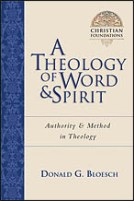
A 1994 Christianity Today book award winner.
In the inaugural volume of his seven-volume systematic theology, Christian Foundations, Donald G. Bloesch surveys his method. His approach is conversant with up-to-the-minute theological concerns but also vitally grounded in the Reformation emphasis on biblical revelation illumined by the Holy Spirit.
In A Theology of Word & Spirit Bloesch draws out the contemporary implications of the biblically founded theology of Augustine, Luther, Calvin and Barth. He also offers fresh and faithful discussions of relativism, the present church conflict over biblical authority, fideism and rationalism, feminine-gender language for God, narrative theology, and the hermeneutical problem.
Harvesting the fruit of a lifetime of devoted scholarship and passionate dialogue, Bloesch offers his assessments and reflections at a time of extraordinary change and challenge. In A Theology of Word & Spirit he points the way toward a confessional theology for the 21st century.
[A Theology of Word & Spirit is] a masterful reflection on the nature of scriptural authority and method.
—New Oxford Review
Bloesch argues convincingly for a theology of Word and Spirit, not of rationalism or mysticism. Like Luther and Calvin, Forsyth and Barth, his mentors, Bloesch believes that the power of the Word of God creates its own hearing. Christologically centered and biblically rooted, Bloesch is in continual dialogue with theologians past and present. He states that his desire in [A Theology of Word & Spirit] is to produce 'an enlivening and liberating orthodoxy,' and he has succeeded.
—Robert K. Johnston, Fuller Theological Seminary
With A Theology of Word & Spirit evangelical elder statesman Donald Bloesch launches his seven-volume magnum opus, a systematic theology based entirely on God's self-revelation. It is an evangelical theology for the entire church of God and boldly proclaims a Christocentric approach that avoids subverting the gospel to alien systems of thought. Those who have appreciated and benefited by Bloesch's theology in the past must read this volume (and the rest of the series) as it sums up his mature thinking and provides a ringing call to a return to a purely theological way of doing theology. Those who have not discovered Bloesch previously will find here a refreshing alternative to the current tendency to make theology into a tool for non-Christian ideologies and worldviews. This is a program for a purely theological theology.
—Roger E. Olson, Bethel College
The refreshing character of [A Theology of Word & Spirit] lies in its ethos as much as in its argument. Donald Bloesch's theology comes out of a believing heart, a lucid mind and a teacher's penchant for clarity and communication. Students of theology everywhere will profit greatly from this carefully nuanced guide through the labyrinth of contemporary theological approaches as well as the classical theological texts. Committed to the Anselmic tradition of credo ut intellagam (I believe in order to understand), Bloesch serves the evangelical world well by insisting on the central reality and authority of Jesus Christ as revealed in Word and Spirit through faith to faith. This is edifying as well as instructive reading. Few books on systematic theology leave the reader at the end, hungering for more, but this is an exception. I am left eagerly awaiting the next volume.
—Ray S. Anderson, Fuller Theological Seminary
>Bloesch … aims at a more 'constructive' engagement with the modern theological situation dating from Schleiermacher and reaching its peak, or at least one of its peaks, in Karl Barth. He moves with erudite ease from Pannenberg to Tillich to Tracy to Ellul to Dulles… Bloesch's project will be an admirable introduction to the Christian theological situation at the edge of the Third Millennium.
—First Things
[A Theology of Word & Spirit] signals the appearance of a major theology by a leading evangelical who is immensely learned in the literature of theology past and present, and fully engaged in the life of faith today. Anything but a bland proposal, it is characterized by a striking view of theological method--being an adamant defense of revelational theism over against all efforts to ground the message intellectually, independent of faith. Here is an uncompromisingly confessional theology in strongest opposition to all forms of revisionism--liberal or evangelical. I can only compare it to the systematic theology of Wolfhart Pannenberg (also now being written) alongside which it will stand as the other major alternative for evangelicals. Bloesch proves to me that the Barthian project is far from dead or lacking in scholarly vitality. A great achievement is in the making.
—Clark H. Pinnock, McMaster Divinity College
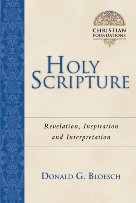
A 1995 Christianity Today Book Award Winner.
In Holy Scripture, Donald G. Bloesch sets out the pivotal evangelical doctrines of the Bible's revelation, inspiration and interpretation.
Wishing to "defend the orthodox evangelical faith from its friends as well as its enemies," Bloesch provocatively argues against both evangelical rationalism and liberal experientialism. And he proposes the alternative of biblical evangelicalism--which sees Scripture as the written Word of God but stresses that it becomes the living Word of God only through the illumination of the Holy Spirit.
In dialogue with Martin Luther, John Calvin, P. T. Forsyth, Karl Barth and Emil Brunner, Bloesch’s Holy Scripture examines the implications of biblical authority for the twenty-first century. It surveys the role of the Bible as seen within the Bible itself and as that role has unfolded through centuries of Christian tradition. It also explains and critiques many highly contested issues, such as the value of biblical criticism, the meaning of myth, the plethora of hermeneutical options and the nature of truth.
Holy Scripture could well represent the high point of evangelicalism's dialogue with modern skepticism.
—The Covenant Quarterly
Bloesch has given us… much that is profitable, the heart of many years of effective theological reflection.
—Journal of the Evangelical Theological Society
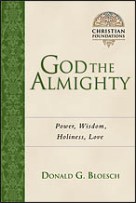
A 1996 Christianity Today Book Award Winner.
The doctrine of God is receiving renewed and vigorous attention in theology. Even a cursory examination of recent scholarship reveals what leading evangelical theologian Donald Bloesch describes as "a mounting controversy over the concept of God."
God is variously portrayed as vulnerable (Jürgen Moltmann, Clark Pinnock), as lover (Norman Pittenger, Ronald Goetz), as friend (Alfred North Whitehead, Sallie McFague) and as empowerer (Rosemary Radford Ruether). Bloesch agrees that many of these proposals have some biblical merit. But what is lacking, he argues, "is a strong affirmation of the holiness and almightiness of God."
So in this volume, while Bloesch offers cogent criticisms of the classical view of God, he skillfully seeks to hold in faithful tension "the polarities that are reflected in God's nature and activity--his majesty as well as his vulnerability, his sovereignty as well as his grace, his wholly otherness as well as his unsurpassable closeness, his holiness as well as his love."
This work will be read by all who are interested in the renewal of systematic theology in our time. It is an inspiring, balanced, instructive, rigorous inquiry.
—Thomas C. Oden, Drew University
This volume makes a valuable contribution to evangelical theology. It is well written, insightful, balanced, biblical, and worshipful, and the topic is supremely worthy of reflection.
—Bibliotheca Sacra
God the Almighty shows a reputable evangelical theologian at the top of his form. Bloesch’s engagement with a host of Protestant traditions, as well as Catholic and Orthodox voices, is a model for accomplishing evangelical theology.
—Journal of the Evangelical Theological Society
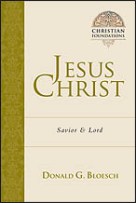
A 1998 Christianity Today Book Award Winner.
With his customary encyclopedic reach and epigrammatic style, Donald Bloesch turns his attention to the hotly disputed, yet absolutely crucial, subject of the person and work of Jesus Christ. He brings a much-needed clarity to the current Christological debate, which, as Hans Küng noted, "has persisted since the dawn of the modern age [and] has not yet been resolved."
Drawing on more than forty years of devoted study, Donald Bloesch now brings a much-needed clarity to the discussion. Well apprised of the most recent developments, yet grounded in his own deep Reformed faith, Bloesch goes beneath current reconstructions of the Jesus of history to probe underlying issues of theological method, models of salvation, the plausibility of miracles, the language of faith and the doctrine of sin.
As Bloesch declares, "Christology constitutes the heart of theology, since it focuses on God's work of salvation in the historical figure Jesus of Nazareth, and the bearing that this has on the history of humankind. To know the nature of God we must see his face in Jesus Christ." This important book is a vital exercise in seeing Jesus Christ faithfully and truthfully.
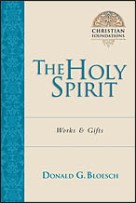
In The Holy Spirit: Works & Gifts Donald Bloesch aptly brings together his grasp of historical and systematic theology as well as his deep concern for spirituality. The fruit of a lifetime of study and devotion, this book masterfully interweaves biblical study, historical overviews and reflection on contemporary developments and issues to shed light on faith in God, the Holy Spirit. On a topic that sadly threatens to divide the church, Bloesch strives to build bridges between the various traditions of Christian faith, especially between Reformed theology and the Pentecostal movement.
Building on the inaugural volume of this series, A Theology of Word and Spirit, Bloesch guards against the equal dangers of a subjective spiritualism and a cold formalism. He speaks out of the perspective of the Protestant Reformation with its emphasis on the complementarity of Word and Spirit and the priority of grace over works. But he also acknowledges the Pentecostal perception that the work of the Spirit involves empowering for witness as well as sealing for salvation. Bloesch likewise finds truth in the mystical tradition of Roman Catholicism and Eastern Orthodoxy that the Spirit calls us to holiness of life as well as to a decision of faith.
This wide-ranging and in-depth reflection on the presence, reality and ministry of the Holy Spirit serves as a landmark guide to those seeking a faithful theological understanding of the Holy Spirit as well as those searching for a renewing and empowering hope for the church of Jesus Christ.
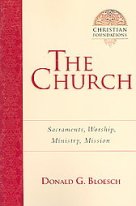
In this volume, Donald Bloesch explores with charity and balance the contours of ecclesiology. He forthrightly takes up the most controversial of issues ranging from matters of church authority, the sacraments and worship, the church's place in the plan of salvation, the church and the kingdom of God, to the issue of church reunion. Evangelical in spirit, ecumenical in breadth and biblical in depth, Bloesch's theology of the church calls for reformation and renewal according to the Word and Spirit of God.
Ecclesiology is the cutting edge of serious theological work in the twenty-first century. And this is one of the most important books on the church to appear in several decades. As always, Bloesch is irenic yet tough minded, reformed but also catholic, steadily orthodox and vibrantly evangelical! This book about the church is a wonderful gift to the church.
—Timothy George, Dean, Beeson Divinity School, Samford University; executive editor Christianity Today
In The Church Donald Bloesch has brought together evangelical faith and ecumenical vision to witness boldly to a needed twenty-first-century catholicity.
—Gabriel Fackre, Andover Newton Theological School
All Christians who want the church to be and to do what Christ intends will benefit from a prayerful consideration of this heart-stirring and thought-provoking proposal.
—Terrance Tiessen, Providence Theological Seminary
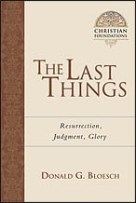
In The Last Things Donald G. Bloesch takes up difficult and sometimes controversial themes such as the coming of the kingdom of God, the return of Jesus Christ, the life hereafter, the millennial hope, the final judgment, hell, heaven, purgatory and paradise.
Wrestling with biblical texts that often take metaphorical form, Bloesch avoids rationalistic reductionism as well as timid agnosticism. While he acknowledges mystery and even paradox, Bloesch finds biblical revelation much more than sufficient to illuminate the central truths of a Christian hope articulated throughout the history of the church.
The Last Things is not just a review of past Christian eschatology but a fresh articulation of the grace and glory of God yet to be consummated. The triumph of the grace of Jesus Christ and the dawning of hope beckon us to reach out in the power of the Spirit to receive that blessed future and the promise to renew the life of the church universal today.
In this volume, Bloesch brings to completion his magnum opus. As with the earlier volumes, readers will be stimulated to think more deeply as they interact with one of the great evangelical theologians of our day on the important issues of the last things.
—Millard J. Erickson
—Robert Webber, Northern Baptist Theological Seminary
This book should be in the hands of evangelical and ecumenical pastors and teachers who want to see how classical Christian eschatology can speak a powerful contemporary Word.
—Gabriel Fackre, Andover Newton Theological School
Donald G. Bloesch (Ph. D., University of Chicago) is professor of theology emeritus at Dubuque Theological Seminary in Dubuque, Iowa. He has done postdoctoral work at the universities of Oxford, Tübingen and Basel and has written numerous books, including Faith and Its Counterfeits, Christian Foundations Series, Evangelical Theology in Transition, Theological Notebook Volume 3, Essentials of Evangelical Theology, The Future of Evangelical Christianity, The Struggle of Prayer and Freedom for Obedience. He is also a past president of the Midwest Division of the American Theological Society.
Reviews
4 ratings
Dr. Anthony Mazak
7/10/2021
This is a great read for a old soul in Christ like me who pray, meditate, relate, and flow as I venture along this journey. I sense that life is the heart of the matter and not the mind of the matter. Dr. Donald G. Bloesch has done a awesome job describing Systematic Theology as being sweet, short, simple and to the point, just like love is for those who knows what love is. "Word Studies."
Sean
7/14/2018
This is not so much a systematic theology as a proposal or agenda for systematic theology. The author is more interested in comparing trends in historic and contemporary theology than in constructing and detailing out Christian doctrine. He does a good job in explaining different schools of theology, including his own (moderate reformed with heavy Barthian influences), making this a worthwhile read, but new students of systematic theology seeking an actual foundation in doctrine would be better off starting with a standard textbook such as Louis Berkhof's Systematic Theology or Millard Erickson's. (To be honest, in order to do that properly in addition to the comparative work would have doubled the size of the volumes.) For the most part this is a fairly easy read for an academic work. As other reviewers here and elsewhere have noted, the latter few volumes are not as good as the earlier ones. I found the last three--on the Holy Spirit, the church, and eschatology--rather weaker. The eschatology volume in particular exhibited some methodological problems and bordered on incoherence, I'm sorry to say. Still, it's a very good set, and Bloesch deserves wider reading for his contributions to contemporary evangelical theology.
Ralph A. Abernethy III
9/7/2017
Glenn Crouch
2/15/2016
Whilst I didn't find the volumes on the Holy Spirit and on the Church, as good as the other volumes - this is a worthwhile read - and a reasonably easy read I believe :)